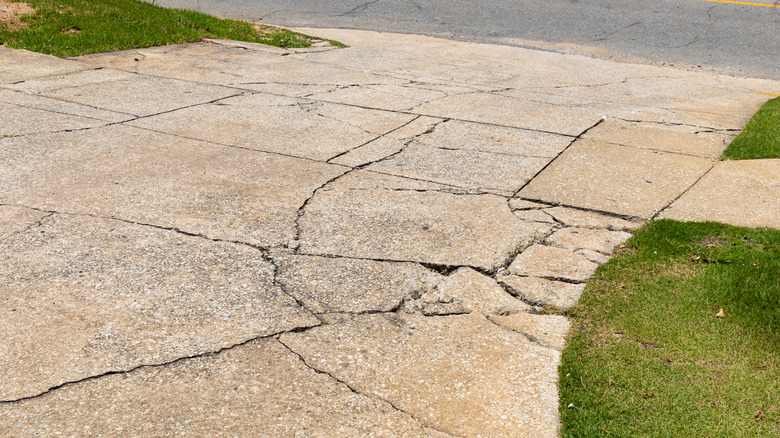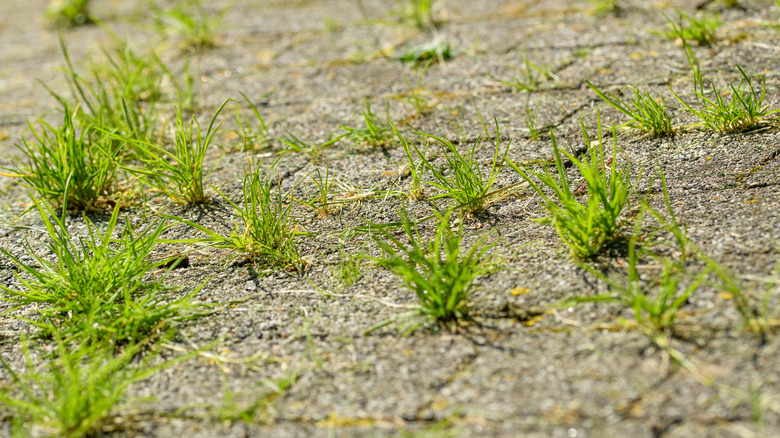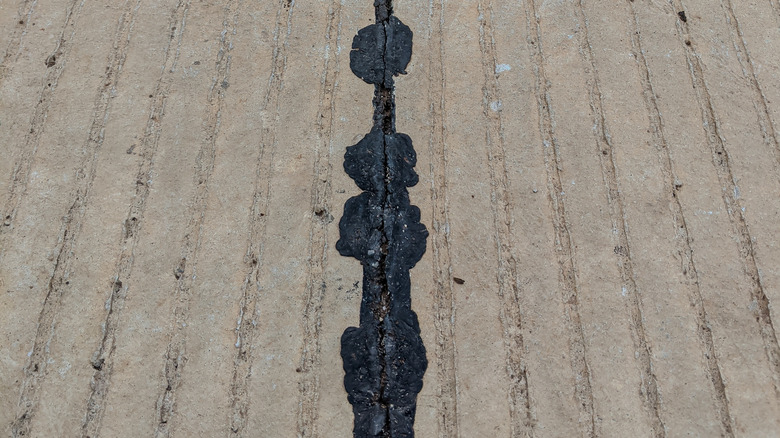How Small Cracks In A Driveway Can Quickly Become A Much Bigger Problem
In the United States, infrastructure repairs can be a political flashpoint, but it is a necessity given how quickly our roadways fall into disrepair. Crumbling roads cost a lot to repair and can damage vehicles. But it's not just the federal government that has to worry about degrading pavement and the expenses that go along with it. Small cracks in your own driveway can put a big dent in your wallet too. It could also put your safety at risk. That is why when you notice even a small fissure, it's important to address the issue before it expands.
While some personal driveways are made from materials like gravel, they are most commonly going to be comprised of concrete. Regardless of how smooth concrete appears when it's poured, finished, and cured (maintaining proper moisture and temperature levels), there are going to be unavoidable microscopic fractures no matter what essential tasks you take on to prevent driveway cracking. Over time, these cracks will open up your property to environmental hazards like extra moisture during rainy seasons and chemical exposure from running automobiles that lead to natural deterioration through erosion and thermal expansion. Accidental falls account for hundreds of thousands of injuries every year, so stumbling over an expanded crack is a quick way to land yourself in the hospital with potentially crushing medical debt. For your health and safety, as well as the maintenance costs on your car, addressing driveway cracks should be a top priority.
How the cracks in your driveway can get worse over time
Erosion is the natural process by which rocky substances are ground down or dissolved over time, most often by water (think the Colorado River cutting the Grand Canyon), but also by wind or other elements like gravity. Your driveway doesn't operate at the same scale as the Grand Canyon, but concrete will similarly be worn away by running water if your region gets a lot of rain. However, those microscopic cracks don't just allow water to snake in; they offer a place for water to freeze during colder months (much like you see with your home's pipes). Ice is another source of erosion due to freeze-thaw cycles in which temperatures fluctuate daily in and out of freezing.
Because water expands when it changes form into solid ice, it will widen any cracks in the driveway, only to shrink back down when it thaws. This is primarily what leads to significant damage like potholes, and it is known to affect the lifespan of concrete in colder regions. Weeds can also develop through these cracks, with roots that further break apart the solid material around them. Temperate climates are not immune to driveway problems either. Another factor affecting the longevity of your concrete is simple wear and tear, as cracks in load-bearing material are potential points of failure. If the weight of your vehicle becomes too much to bear, or you add extra weight from things like moving pods, you risk making small cracks worse.
There are options to start patching up your driveway's cracks before they become a problem
The best way to address cracks on your driveway is to take preventative measures before they get too big. Filling cracks or patching holes before you get to more serious surface treatments like chip seals or asphalt overlays is going to extend the life of your driveway by not allowing moisture to build-up in the cracks. A simple fill is also going to be cost effective while most of the driveway is in good shape. Elastic materials would be best suited for filling the gap and preventing moisture seepage. It could even add an additional two to five years to your driveway's lifespan, depending on the amount of traffic.
There are plenty of affordable caulking tools you can buy to fill the cracks in your concrete driveway. However, if you cannot seal up small problems in time, you may have to take additional measures to fix your driveway. Sections of concrete sidewalk can be removed wholesale by saw-cutting along the seams to cut through the dowels or tie bars that hold the whole thing together, and the same can be done for an irreparable segment of driveway. This is going to be an expense, and you will likely need to hire a professional. To prevent the extra cost, it's a good idea to keep an eye on your driveway's health before those small cracks get out of hand.


